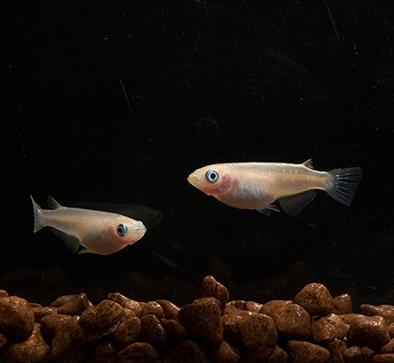
Credit: TANAKA.
Larval nutrition plays a role in determining the sexual characteristics of Japanese rice fish, also called medaka (Oryzias latipes), report a team of researchers led by Nagoya University. The findings, published in the journal Biology Open, could further understanding of a rare condition in humans and other vertebrates, where they genetically belong to one sex but also have characteristics of the other.
Decades ago, scientists found that medaka fish often undergo sex reversal in the wild. This involves genetically female larvae (meaning they have two X chromosomes) going on to develop male characteristics, or vice versa. This has made medaka fish a model organism for studying environmental sex development and other biological processes they have in common with vertebrates.
Now, Nagoya University reproductive biologist Minoru Tanaka and colleagues in Japan have gained further insight into the factors that affect medaka sex reversal, potentially providing direction for future research into similar conditions in other species.
Scientists had already discovered that environmental factors, such as temperature changes in the brackish and fresh waters where medaka fish live, are likely involved in their sex reversal. Tanaka and his team wanted to know if nutrition also played a role.
They starved medaka larvae for five days. This was enough time to affect their metabolism without killing them. Three to four months later, the team examined the fish and found that 20% of the genetically female medaka had developed testes and characteristically male fins. The same did not occur in larvae that were not starved.
Further tests showed that sex reversal in the fish was associated with reduced fatty acid synthesis and lipid levels. Specifically, starvation suppressed a metabolic pathway that synthesizes an enzyme called CoA, and disrupted a gene called fasn. These disruptions led to reductions in fatty acid synthesis. The scientists also found that a male gene, called dmrt1, was involved in the female-to-male reversal.
“Overall, our findings showed that the sex of medaka fish is affected by both the external environment and internal metabolism,” Tanaka says. “We believe lipids may represent a novel sex regulation system that responds to nutritional conditions.”
The team next plans on identifying other internal factors involved in medaka sex reversal. Future research should try to find the tissues or organs that sense changes in the internal environment and then produce key metabolites to regulate sex differentiation.
###
This study, “Starvation causes female-to-male sex reversal through lipid
metabolism in the teleost fish, medaka (Olyzias latipes),” was published in the journal Biology Open on April 7, 2020 at DOI: 10.1242/bio.050054.
Media Contact
Minoru Tanaka
[email protected]
Original Source
http://en.
Related Journal Article
http://dx.




